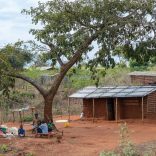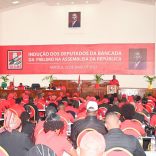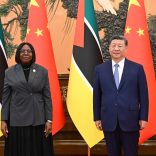Mozambique: Chapo calls for modernization of SERNIC
Mozambique: “A normal country cannot live on donations” -Nyusi

Photo: Ministério da Agricultura e Desenvolvimento Rural
It is not the peaceful citizens who said this, much less theso-called ” detractors” of the government of the day. It is the Head of State and Head of the Government of the Republic of Mozambique himself acknowledging that it is “abnormal” for a country to live on donations when it has land, water and human resources to produce and feed the approximately 28 million Mozambicans.
Speaking last Friday from the Lower Limpopo Regadio, in Chongoene district, Gaza province, during the a ceremony marking the delivery of Program Sustenta production and financing kits to farmers in the southern province, Filipe Jacinto Nyusi reiterated the need to transform the so-called ‘Pearl of the Indian Ocean’ into a productive territory and not (just) a consumer.
“We have to transform Mozambique into a productive and sustainable country. We cannot continue to live on donations. People give, give and they get tired [of giving]. (…) Should we accept donations, when in fact everyone sees that it gives [as in the case of natural disasters]. But a normal country, which has land, water and people who work, cannot continue like this,” Filipe Nyusi said, after overseeing the delivery of agricultural inputs to small, medium and large farmers in the province of Gaza.
The Head of State pointed out the necessary steps for the transformation of the country from consumer (of donations) to producer. “This means being more demanding with ourselves. If we just make business out of scams, it won’t work. It won’t work. We will transform Mozambique into a productive and sustainable country and not just a consuming country, mainly consuming donations. To achieve this, we have to move from words to action.”
The President of the Republic assured the population of the province of Gaza that his government was focused on attaining the well-being of all Mozambicans, and providing food, water, electricity, good housing and roads.
A study published by the Rural Observatory (OMR) in May 2016 noted that more than half of Mozambican families were at that time subject to food insecurity, a third of them chronically. The document also said that about 30% of families were considered poor or that at their limit in terms of diet diversification and frequency of meals, and that 80% of families could not access an adequate diet.
In contrast, the country has 148,000 hectares of arable land, of which, in 2015, only 62,000 hectares were being explored.
Sustenta is a pillar of the Five-Year Plan
As a way of reversing this picture, Filipe Nyusi, who promises to eradicate hunger in the country by the end of his term (2024), said that the Sustenta Project was “an integral part of the government’s Five-Year Plan” which would allow “inclusive and sustainable growth” involving the private sector and family farming.
“Sustenta empowers the farmer to start to produce with knowledge, with means and professionalism. Sustenta will increase family incomes; production and productivity; provide opportunities for women and young people, and stimulate competitiveness,” the President of the Republic told the farmers benefiting from project funds.
Last Friday, the Ministry of Agriculture and Rural Development granted support worth 1.6 billion meticais to small, medium and large producers in the province of Gaza. Support included 20 tractors, seeds, fertilisers and pesticides for about 8,000 families.
Cheques with values ranging from four to six million meticais were delivered to 32 of a total of 232 semi-commercial producers, and of values ranging from 100 to 400 million meticais to three rice processing companies. Eighty-five motorcycles were delivered to extension workers.
According to the Minister of Agriculture and Rural Development, Celso Correia, nation-wide, 180,000 families are registered for the Sustenta programme, alongside 200 semi-commercial farmers and more than 200 small enterprises.
“We have started to transform the Sustenta programme into a real programme on the ground,” said Correia, clarifying that the credit was approved by an independent committee including a civil society component, the Confederation of Economic Associations of Mozambique [CTA] and ministry representatives.
The Sustenta programme was first launched in 2017 in 10 districts in the provinces of Nampula and Zambézia. In July of this year, the government decided to replicate the project all over the country.
Within the framework of the Sustenta programme, Gaza has already benefited from more than 600 million meticais for the rehabilitation of irrigation infrastructure, and the levelling of 5,000 hectares of arable land.
By Abilio Maolela












Leave a Reply
Be the First to Comment!
You must be logged in to post a comment.
You must be logged in to post a comment.